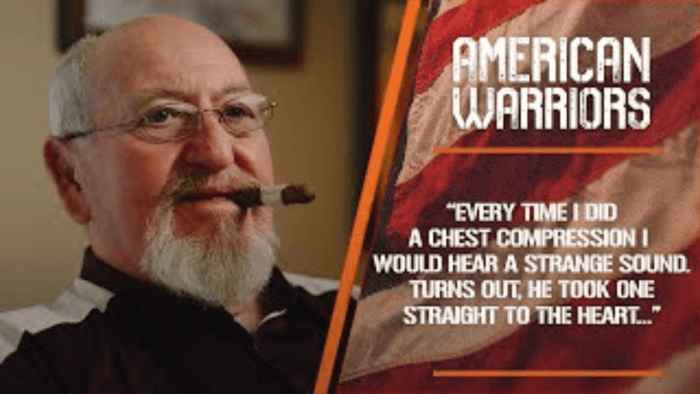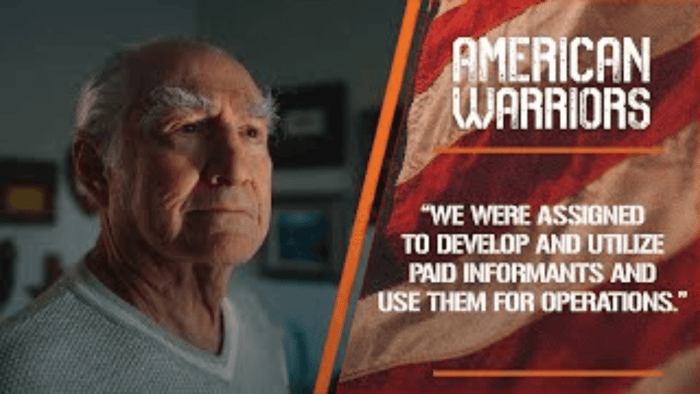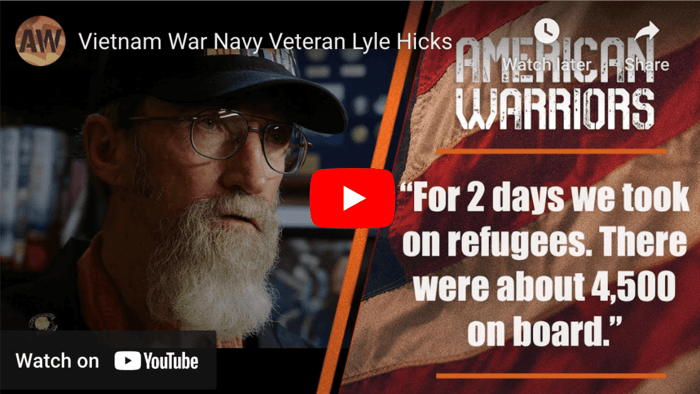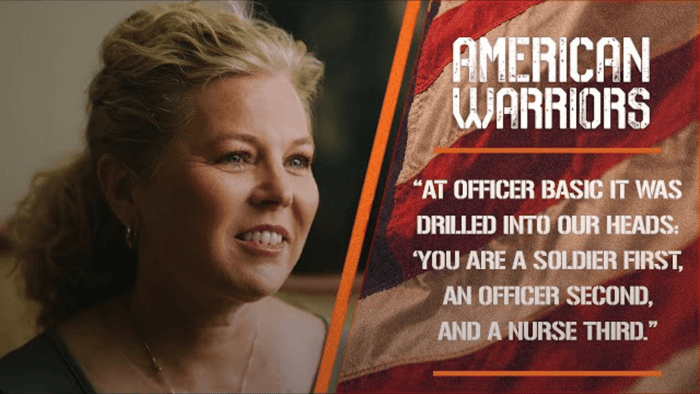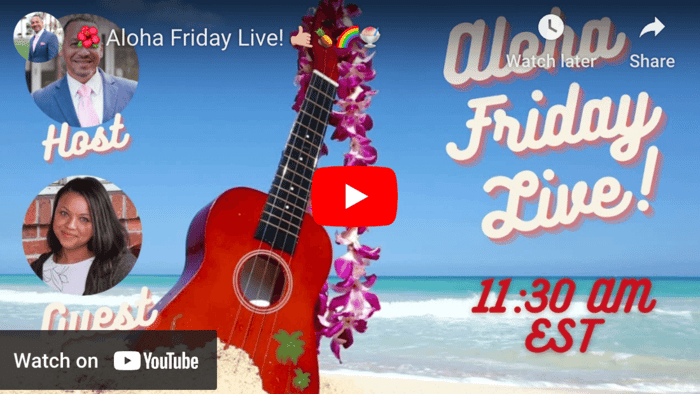An American Warriors production - Dennis Guthrie | Combat Medic in Vietnam
Lesson Plan
In this lesson, we will hear from Dennis Guthrie, a combat medic who served in Vietnam. We will learn about his experiences and insights into what it was like to serve in the military during one of the most challenging periods in American history. The group discussion questions will help us understand the challenges and rewards of serving in the military, appreciate the sacrifices made by veterans, and learn from the experiences of veterans like Dennis Guthrie.
Objectives
- To learn about the experiences of a combat medic in Vietnam
- To understand the challenges and rewards of serving in the military
- To appreciate the sacrifices made by veterans
Group Discussion Questions
- What was Dennis Guthrie's motivation for joining the army?
- How did his training as a medic prepare him for his role in Vietnam?
- What was his experience like during his first firefight?
- How did his experiences in Vietnam shape his life after the military?
- What can we learn from the experiences of veterans like Dennis Guthrie?
Introduction
In this video, we will hear from Dennis Guthrie, a combat medic who served in Vietnam. He will share his experiences and insights into what it was like to serve in the military during one of the most challenging periods in American history.
Feature Video
Transcripts
(00:26)
I grew up in Portland, Oregon. I wanted to be a wrestling coach, football coach, and science teacher. In August of 67, the biggest draft call of Vietnam happened. My student deferment wasn't any good, so I joined the army.
(00:50)
Somebody had your file, and they read through your file, and the guy says, well, you got two years of biology as a science major, and you've had a comparative anatomy and Aka, and you're built in as a medic.
(01:05)
And I says, well, how long is the medic school? He says, well, it's about 50 weeks, 52 weeks. And I'm going I'm thinking, well, that'll keep me out of Vietnam for another year, right? Okay, sign me up.
(01:19)
There was only one place they needed trained medics because they were always getting shot up, right? So I knew I was trained well, and I knew I could do a job, and I knew I could save lives. So why put off the inevitable?
(01:36)
Is basically we landed in in Benoit. We got out of the airplane. It was like 110 degrees, and the humidity was like, 90%, right? I mean, it's like walking into. Asana for six months. I was in Bravo, first of the 7th 1st Cav Division.
(02:07)
We were out of Kwan Lloyd, which was a small fire base. It was for small fixed wings and helicopters, and from there we would take choppers and go out to the Cambodian border, her, and do these search and destroy missions for certain areas.
(02:28)
Because of my advanced training, they put me in as a head company medic, which meant I was with the CP or the command position. And I had four other medics, one platoon medic for each platoon, and I was in charge of those four other guys, making sure they had the supplies they needed and double checked that they were doing their job, et cetera, et cetera.
(02:52)
I was only in the field for a couple of weeks, and we were on what they call a search and destroy. We were on the Cambodian border. We were looking for bunker complexes, point man got hit, and of course, anytime the first shot, everybody lays down and returns fire.
(03:17)
And if nothing comes back, then you're good. If you still getting return fire, then the firefight's on the lead man was on the ground or the point man. And so there was an old mahogany stump that was about three foot tall.
(03:34)
And so I grabbed him and rolled him over the top of me and behind the stump so I could get up, so I had a little bit of COVID to work on him. And he wasn't breathing. And I didn't see any serious blood, but he wasn't breathing.
(03:50)
So I started CPR. And but every time I did my chest compressions, I kept hearing the sound. Well, you gotta realize this is the first time I'd ever had that amount of adrenaline pumping at one time when you got live rounds going by you.
(04:08)
And I opened his shirt and he'd taken one right through the heart. So basically he was DOA. He kind of pissed me off and I ended up picking up the M 16. And the individual who probably shot him, I don't know that for a fact because I wasn't up there, but he had an AK 47 and he was shooting to his left and hiding behind this pole in a kitchen area, which was in plain sight of me because he was behind the pole.
(04:45)
And I eliminated the enemy, let's just put it that way. I went into the kitchen area where the individual who I'd been shooting at was laying dead on the ground. But evidently, just before the firefight, he had just fixed himself a lunch, which was a bowl of rice, this being the bowl.
(05:15)
So I sat down and literally ate his lunch after I killed him. That was my job, was to save lives. But sometimes you have to take life to save the life that you're working on. Otherwise he's going to die, and I'm going to die.
(05:32)
If I die, help the person that needs my help. So you got to do what you got to do. After my first firefight, I never got. I never allowed myself to get really close to anybody. If you get close to somebody, two days later, they could be killed, and then you'd have to go through all that remorse.
(06:05)
I was more professional. This is what we got to do. This is what we got to do. You make sure this make sure that and I kind of stayed to myself, I think, for more of self protection. Um, so the colonel of the 15th medevac unit came up at one of the award ceremonies and said, hey, you've been in the field for six months.
(06:31)
You know, you can transfer out and volunteer for medevac. I guarantee you three hots and a cot. Well, when you're living in the jungle in the mud and the blood and the beer and whatever else and the rainy season coming on, I said, hey, that sounds pretty good, sleeping in a get with a roof in my head and getting three hots.
(06:56)
But he neglected to tell the whole story, which was every time he went in to pick up wounded, somebody had wounded those americans, and that means there was automatic weapons fire, and they had these big red and white crosses on it.
(07:17)
Made a hell of a target on those h model hueys. Right. We were actually picking up the wounded after they had already been treated cases by someone who were doing my job on the field. So they were doing the initial EMS.
(07:41)
And I was transporting them from point a to what was now known as the mass unit. Right. Forward aid station. You could take three. Stack three litters. You could have two ambulatory. You'd get a sit rep on from the ground unit.
(08:00)
So you say, okay, I want this stretcher first, this stretcher second, the stretcher third. Then we'll take ambulatory, one on the one side and one on the other. Say if we had a full load, but you had to have a loading sequence so that when you landed, you yeah.
(08:19)
It would all flow smoothly fast, so we can get the hell out of Dodge. Because obviously you've got automatic weapons being shot at you or around you all the time, so you didn't want to loiter I mean, it's not like you want to play a game of cards while you're waiting.
(08:43)
I'd be setting IVs. I'd be doing a set rep on each 190 percent of everybody we took in that was living, stayed living. They developed what they call the golden hour, which is still being used now. So if you could get an injured person from the field to a IVAC hospital or medical facility within an hour, they had a 90% chance of surviving, no matter what their injuries were.
(09:17)
So consequently, that was all this EMS stuff that we have today in civilian life, these met lifeline, these medevac choppers, all of those type of things started in Vietnam. You the august 12 of 69, the viet vietnamese made a big push on several fire bases and.
(09:49)
R happened to be one of the fire bases. Midnight they started dropping in direct fire, and they had hit a couple three bunkers direct hits. And so I moved down the line and started treating the wounded.
(10:16)
And because there was nobody else on the bunker, I started using return fire so that they knew somebody was in that bunker, that it wasn't just available to be overrun. You see what I'm saying? It lasted about 6 hours, and I went back for resupply, brought more people in to do the bunkers.
(10:40)
And it was interesting for about 6 hours. At 06:00 in the morning, I went back to my rack or my bunk, whatever your bed, whatever you want to call it. And I was like because I hadn't had any sleep that night, right?
(11:00)
And the first sergeant comes in and racks me out of the bunk. Come on, colonel wants to see you up at the mess. All they call everybody's attention. They called our names and put us out front, and I don't even know what's going on, right?
(11:29)
Um I left Vietnam in April 17 of 1970. Life is nothing more than going from one transformation of life to another, right? My transition or those of us who served in Vietnam or in the military at that time, went through a little more severe than others of our era.
(12:02)
You are what you what your life's experiences make you. It changed my entire life. You I joined a VFW in 1984. I've been doing things with them for about 38 years. Started out as commander of post 41 eight here in redmond state of Oregon.
(12:27)
I was a commander in 2000, 2001, western conference. Elected me as surgeon general in 2000 and 910, and then again in just last year 20, 21, 22, serving as a medic in Vietnam. It took me probably 20 years, 30 years to kind of get my own stuff together, but then I realized that I needed to keep serving veterans.
(13:04)
So the BFW was established 120 plus years ago. Veterans helping veterans. That's our model. All I've ever done, no matter what I was elected to, was to help my community that I lived in, the veterans in that community, the youth in that community.
(13:27)
When you're young, you don't really have a trail to follow, but it develops as you go through life, and pretty soon, you go, okay, this is the path that I'm supposed to be on, so. If you're that type of person that takes a job on, you're going to do the best job you can.
(13:51)
And yes, you're going to make mistakes, but you learn from those mistakes and you keep on trucking and you keep keep moving forward and you do the best you can. And hopefully it's good enough at the end of the day.
